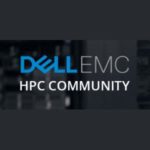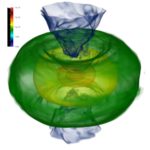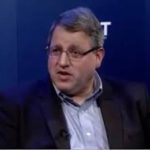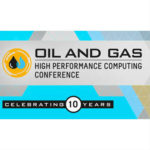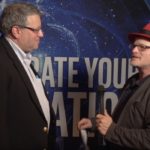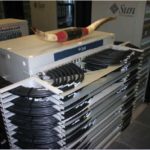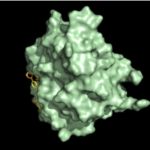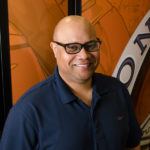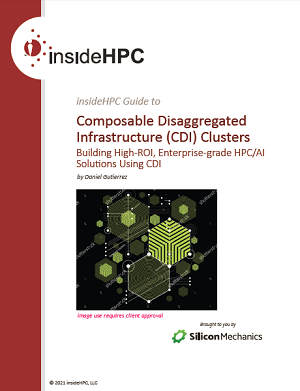The Dell EMC Community Meeting has published their preliminary speaker agenda. The event takes place March 25-27 in Austin, Texas. The Dell HPC Community is a worldwide technical forum that facilitates the exchange of ideas among researchers, computer scientists, executives, developers, and engineers and promotes the advancement of innovative, powerful HPC solutions. The vision of the […]
Supercomputing Neutron Star Structures and Mergers
Over at XSEDE, Kimberly Mann Bruch & Jan Zverina from the San Diego Supercomputer Center write that researchers are using supercomputers to create detailed simulations of neutron star structures and mergers to better understand gravitational waves, which were detected for the first time in 2015. “XSEDE resources significantly accelerated our scientific output,” noted Paschalidis, whose group has been using XSEDE for well over a decade, when they were students or post-doctoral researchers. “If I were to put a number on it, I would say that using XSEDE accelerated our research by a factor of three or more, compared to using local resources alone.”
Video: Computing for the Endless Frontier at TACC
In this talk from the Intel User Forum at SC18, Dan Stanzione from TACC presents: Computing for the Endless Frontier. “Coming to TACC in 2019, the Frontera supercomputer will be powered by Intel Xeon Scalable processors. It will be the first major HPC system to deploy the Intel Optane DC persistent memory technology for a range of HPC and AI uses. Anticipated early projects on Frontera include analyses of particle collisions from the Large Hadron Collider, global climate modeling, improved hurricane forecasting, and multi-messenger astronomy.”
Industry Leaders prepare for Rice University Oil and Gas Conference in March
The upcoming Rice University Oil and Gas HPC Conference will focus on the computational challenges and needs in the Energy industry. The event takes place March 4-6, 2019 in Houston. “High-end computing and information technology continues to stand out across the industry as a critical business enabler and differentiator with a relatively well understood return on investment. However, challenges such as constantly changing technology landscape, increasing focus on software and software innovation, and escalating concerns around workforce development still remain. The agenda for the conference includes invited keynote and plenary speakers, parallel sessions made up of at least four presentations each and a student poster session.”
Video: Intel to Power Fastest Supercomputer in Academia at TACC
In this video, Dan Stanzione from TACC describes how Intel technologies from Intel will power the World’s Fastest Supercomputer in Academia at the Texas Advanced Computing Center. “If completed today, Frontera would be the fifth most powerful system in the world, the third fastest in the U.S. and the largest at any university. For comparison, Frontera will be about twice as powerful as Stampede2.”
Predictions for SC18: A change in climate for HPC?
In this special guest feature, Dr. Rosemary Francis from Ellexus offers up her predictions for SC18 in Dallas. “It’s almost time for SC18 and this year it’s a biggie. Here is what we expect to hear about at SC18 as the Ellexus team treads the show floor.”
New Frontera supercomputer at TACC to push the frontiers of science
Today the National Science Foundation announced a $60 million award to TACC for the deployment of Frontera, a new machine that will be one of the fastest supercomputers ever available to academia. “The new Frontera systems represents the next phase in the long-term relationship between TACC and Dell EMC, focused on applying the latest technical innovation to truly enable human potential,” said Thierry Pellegrino, vice president of Dell EMC High Performance Computing. “The substantial power and scale of this new system will help researchers from Austin and across the U.S. harness the power of technology to spawn new discoveries and advances in science and technology for years to come.”
Legendary Magnum InfiniBand Switch comes to Computer History Museum
The Computer History Museum in Silicon Valley recently added a piece of TACC’s history into their permanent historical collection — sealing its place as a milestone in computing.
We’re always searching around the world for new, interesting, and important computing objects,” said Dag Spicer, senior curator at the Computer History Museum. “TACC’s Sun Microsystems 2007 Magnum switch was a critical part of high-performance computing at that time in history. The TACC switch was the largest of its class and is an example of InfiniBand technology, which has long been a key enabling technology for high performance computing.”
Podcast: Supercomputing New Enzymes for Breaking Down Plastics
In this TACC podcast, Gregg Beckham from NREL and Lee Woodcock from the University of South Florida describe how they are using supercomputers to engineer an enzyme that breaks down plastic. “We used computer simulations to understand how a polymeric ligand like PET would be able to bind to the enzyme,” said study co-author Gregg Beckham, a Senior Research Fellow and Group Leader at the US National Renewable Energy Laboratory (NREL). “We also conducted experimental work to show that indeed, the PETase can break down water or soda bottles, industrially relevant PET films, and another plastic, polyethylene furanoate.”
Mentorship fosters a Career in STEM
In this special guest feature, Faith Singer-Villalobos from TACC continues her series profiling Careers in STEM. It’s the inspiring story of Je’aime Powell, a TACC System Administrator and XSEDE Extended Collaborative Support Services Consultant. “Options, goals, and hope are what can set you on a path that can change your life,” Powell said.

